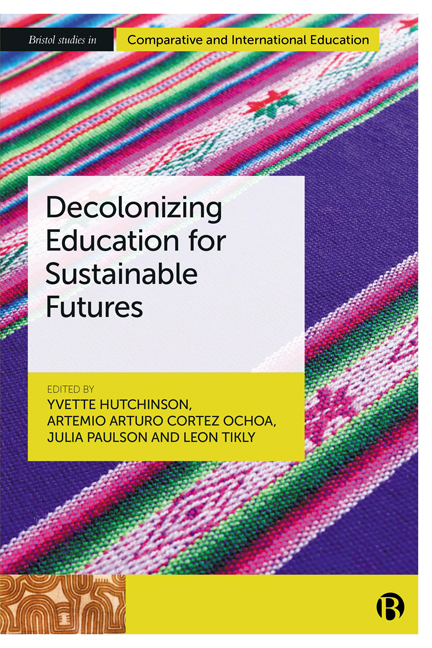Book contents
- Frontmatter
- Contents
- Series Editor Preface
- List of Figures and Table
- List of Abbreviations
- Notes on Contributors
- Acknowledgements
- Introduction
- PART I Connecting Decolonial and Sustainable Futures in Education
- PART II Decolonizing Education for Sustainable Futures: From Theory to Practice
- PART III Education’s Reparative Possibilities: Responsibilities and Reckonings for Sustainable Futures
- Conclusion
- Afterword
- Index
8 - Little Voices: Embracing Difference in Bristol Schools through Engaging Learner Voices
Published online by Cambridge University Press: 18 January 2024
- Frontmatter
- Contents
- Series Editor Preface
- List of Figures and Table
- List of Abbreviations
- Notes on Contributors
- Acknowledgements
- Introduction
- PART I Connecting Decolonial and Sustainable Futures in Education
- PART II Decolonizing Education for Sustainable Futures: From Theory to Practice
- PART III Education’s Reparative Possibilities: Responsibilities and Reckonings for Sustainable Futures
- Conclusion
- Afterword
- Index
Summary
Introduction
In June 2020, when the statue of Edward Colston was toppled, Bristol became the centre of the Black Lives Matter movement in the UK. The international protests had come close to home, and educators in the city felt compelled to respond. Leaders started to look at developing anti-racist policies and shifting the culture of schools beyond Eurocentricity. These policies demanded a review of the curriculum. The showcase of children's work in this chapter sets out to reveal the challenges faced by primary educators in introducing diverse narratives into the curriculum, and highlights the demand for this action by the children themselves. It also demonstrates the critical themes the children identified when they explored the concept of decolonizing the curriculum. Finally, the chapter addresses what one primary school intends to do in order to answer the ‘call to action’ from its children.
Primary and secondary: demands and opportunities
The Black Lives Matter movement really struck a particular chord with the teachers at my school. Our inner-city primary is based in Bristol. The school population is over 60 per cent Black, Asian or Minority Ethnic pupils. It has a three-form entry, ranging from nursery to age 11 and is large enough for 680 pupils. Despite serving a very diverse community, one that echoes the BAME population of the school, our teaching staffing is predominantly white British. Only 14 per cent of the teaching staff is from a BAME group: four teachers from the 29 members of staff. Prior to my tenure as principal, only 5 per cent of the team came from non-white British groups. For us, during that summer of 2020, Bristol felt like the epicentre of the UK movement. Within education, the movement was particularly vibrant. Activities and discussions that had already been taking place in schools, colleges and universities were being revitalized in classrooms and staffrooms across the city.
There were resources flooding in across all education networks: book lists, lesson ideas and suggestions on how to ‘decolonize the curriculum’ were everywhere. Except for the book lists, however, most other resources felt decidedly secondary-school based.
- Type
- Chapter
- Information
- Decolonizing Education for Sustainable Futures , pp. 151 - 170Publisher: Bristol University PressPrint publication year: 2023



